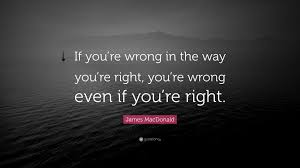
Attempting to politely tell someone they’re wrong can immediately make the other person defensive. For a moment, think that this might have been your personal reaction when someone confronted you as they framed their own perspective and attempted to make their point, armed with a dedicated approach and much evidence.
At some point in time, we’ve all bitten our lip in a situation of debate and replied with “I see where you’re coming from, but…” or “This is how I understood it, could you clarify?” with the hope that some effective conversation would continue and any correction involved could be stated without offending someone. Yes, we all differ and sometimes, getting our perspective out there is more productive than insisting that the other person is missing out on some universal truth.
How then? We move on to explain our understanding, open other possibilities and then cite our experience, all using less harsh overtones as we attempt to correct a given point. Present facts, data or scenarios which support our point of view, suggest an effort to clarify the situation or open it up to further exploration. Suggest revisiting the subject and look at any information together; in the process, possibly discover that we’re on the same page with the other person.
As difficult as it might be, ditch the snarky comments, lose the condescending tone, that only creates a more defensive response. Of course, be firm, never aggressive in stating your point and do so clearly and confidently.
Most important, “Pick your battles”, a good piece of advice. We all have relationships or other human interactions which have an abundance of topics where there are differing opinions, preferences, expectations or beliefs and we need to be selective in regard to deciding the ones worth fighting over. Know when it’s important enough to keep pursuing or when it’s best to just let it go. “Picking your battles” has to do with the idea that it’s neither reasonable nor productive to be willing to argue over every differing point of view that shows up in any relationship or encounter.
We will hardly even agree on everything and in most situations, this is neither necessary or even possible. The point is to recognize that each conversation we have begins before any words are spoken; it begins with the intention we carry into both the dialogue and language we employ in our attempt to get a particular point across. We choose whether or not and how to take a stand as opposed to choosing a battle. That creates a greater likelihood that what follows will be a respectful dialogue rather than an antagonistic struggle.
When we appreciate the degree to which all of our relationships are made better by breaking the habit of responding to differences with defensive and offensive patterns, we’ve already taken the most important step in the process of becoming liberated from our automatic protective reactions.
Easier said than done, you say? Absolutely no argument there. But few things that are worth fighting or taking a stand for, are easy. We’re only human, prone to making mistakes, striving to be right, and always looking for an opportunity to tell someone that they’re wrong.

From the Writer’s Workshop: Write a post entitled “That’s Where You’re Wrong.”









